Review: Funn Python Flat Pedals - Thin & Grippy
Funn MTB components have been around since 1997 and appeared on some of the worlds top riders bikes, such as Greg Minnaar's Honda RN01, back in the day. They specialize in colorful machined and forged aluminum components, including pedals, handlebars, and stems just for starters.
The Python pedal seen here is the revised version that is much thinner and sleeker than the previous iteration, measuring just over 10 mm at the thinnest portion. The Pythons use 11 removable pins per side, come in seven anodized colors, and cost $110 USD.
The pedal body is forged from 6061 aluminum and prioritizes a thin profile over a concave platform surface. This means there's a slight bump over the axle, which some riders may not be huge fans of, but it keeps the leading edges from potentially hanging up on rocks and roots.
The Python pedal seen here is the revised version that is much thinner and sleeker than the previous iteration, measuring just over 10 mm at the thinnest portion. The Pythons use 11 removable pins per side, come in seven anodized colors, and cost $110 USD.
The pedal body is forged from 6061 aluminum and prioritizes a thin profile over a concave platform surface. This means there's a slight bump over the axle, which some riders may not be huge fans of, but it keeps the leading edges from potentially hanging up on rocks and roots.
Funn Python Details
• AL6061 forged body
• Cartridge bearing with full length bushing axle system
• 11 removable, 4mm tall pins each side
• Colors: black, grey, red, blue, green, orange, turquoise
• Area: 110mm length x 103mm width
• Thickness: 10.5mm height (lowest portion of platform)
• Weight: 375g claimed (378g actual)
• Price: $115 USD
• funnmtb.com
• AL6061 forged body
• Cartridge bearing with full length bushing axle system
• 11 removable, 4mm tall pins each side
• Colors: black, grey, red, blue, green, orange, turquoise
• Area: 110mm length x 103mm width
• Thickness: 10.5mm height (lowest portion of platform)
• Weight: 375g claimed (378g actual)
• Price: $115 USD
• funnmtb.com
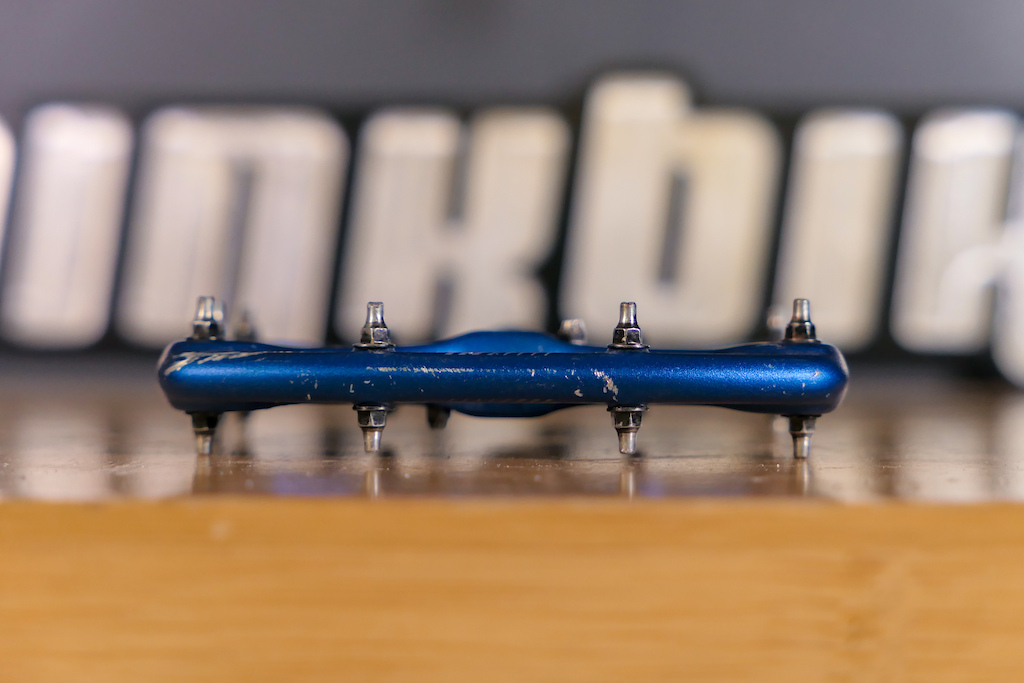
A slim and round platform is what the Python's are all about. If you're looking for a concave feel, you'll have to purchase the extra long pins to achieve that.
Details
Advertised pedal thickness is not as clear cut as it seems. Often, the thinnest portion is not always the most functional zone. This can also be affected by the concavity that the pins may or may not form.
That's the case with the Python's too. The thinnest part of the platform lies on the outer edge and does measure 10.5mm, as stated. However, a more important aspect is the raised portion over the axle bushing, which measures 16 mm at the highest point, tapering down to 15 in the middle. As for the platform dimension, that measures 110 mm in length and 103 mm in width, with the longest distance between the pins being 103 mm by 90 mm.
The stock pins measure 4 mm in height, but there are taller 5.9 mm replacement pins available for about $15 USD. With the replacement pins, you can increase grip and tune the concavity of the overall contact points on the pedal.
The Python pedals use a hardened steel axle that rides on a uniquely long bushing and two cartridge bearings on the outer end. That bushing is threaded into the pedal body and is actually what holds the system together - similar Shimano's pedal design.
Those bearings are captured by a nut at the end of the threaded spindle portion. I’d prefer to see a nylon lock not holding those down. Replacement axle kits go for $30, which includes the specific axle nut tool.
Price and Weight
The Python pedals weigh a reasonable 378 g and include a handful of the stock lower height replacement pins, and a small wrench to unthread those.
Compared to pedals like the Chromag Pressure, they're about 40 g lighter and $20 cheaper. The Pressure pedals also come in a variety of colors, with variable pin heights, and only require allen keys and a socket to service them.
In terms of the dimensions, the Pressures slightly overshadow the Pythons, but with the taller pins installed, the grip of the Funn pedals wins out by a slim margin.
Performance
The platform size of the Python pedals is totally adequate, and the smooth rounded edges are a welcome sight because they usually mean glancing off objects rather than latching on. With that being said, the stock pin height does hold your foot in place reasonably well, but you can feel the bushing bulge underfoot. If you're looking to maximize traction, adding the longer pins on the fore and aft rows will give you much better concavity and therefore a firmer hold.
Not everyone is looking for maximum traction, especially if you're into dirt jumping or freeriding, where you want to move around the bike a bit more. But for serious enduro and downhill riding, you'll want that locked-in feel that the taller pins provide.
Durability
The one downside to those taller pins, of course, is the decrease in ground clearance, although the overall height is still fairly low. If you do manage to catch a pedal pin on a rock or a root, it might be the last time it can be threaded in. I ended up ripping one of the pins out when I snagged a stump, damaging a portion of the threads. There are no options to replace the pin in an adjacent hole, so you may be stuck with a void.
As for the axle internals, they run quite stiff out of the box, which can be a benefit to riders who want to take their feet off of the pedals in the air. That resistance could be seen as a minor downside for those that are highly concerned with efficiency. The preload on the bearing could be adjusted though.
You'll need the proprietary tool to access the internals. Unfortunately, that tool was missing from the box so a pair of grippy pliers were used to open them up for the purpose of the review. Obviously, that's not advised as it will mash the soft plastic wrench notches.
Notice of correction: There was miscommunication after inquiring about said tool's whereabouts - the proprietary axle tool is included in the axle rebuild kit, but not with the pedals themselves.
Inside, the grease was still clear and clean looking with minimal contaminations infiltrating the seals. The Pythons barely saw any wet weather as the testing took place during the dry dusty summer, so they're still spinning smoothly, albeit slowly.
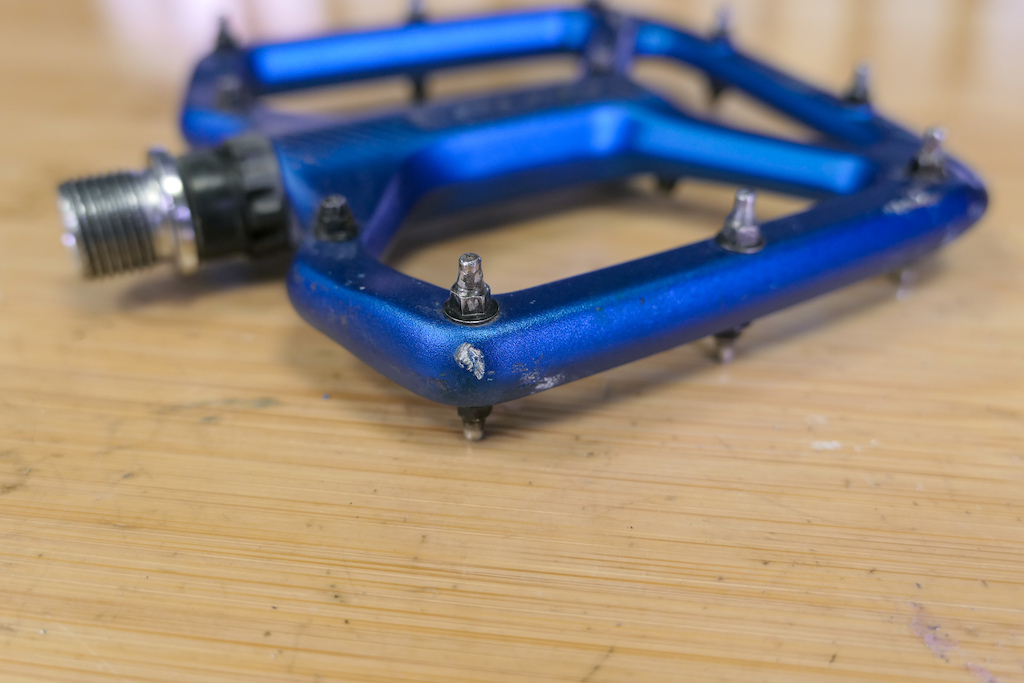
Dangerously tall pins, tons of colors, and burly bushings. The Pythons are a without a doubt a unique pedal.
Pros
+ Slim, round pedal body is less prone to catching on rocks and roots
+ Adding longer pins to fore and aft rows increases concavity and grip to impressive levels
Cons
- Pins can damage threaded portion of body instead of shearing off
- Raised portion of the body over the bushing can be felt without longer pins (not included)
Pinkbike's Take
Author Info:
Must Read This Week
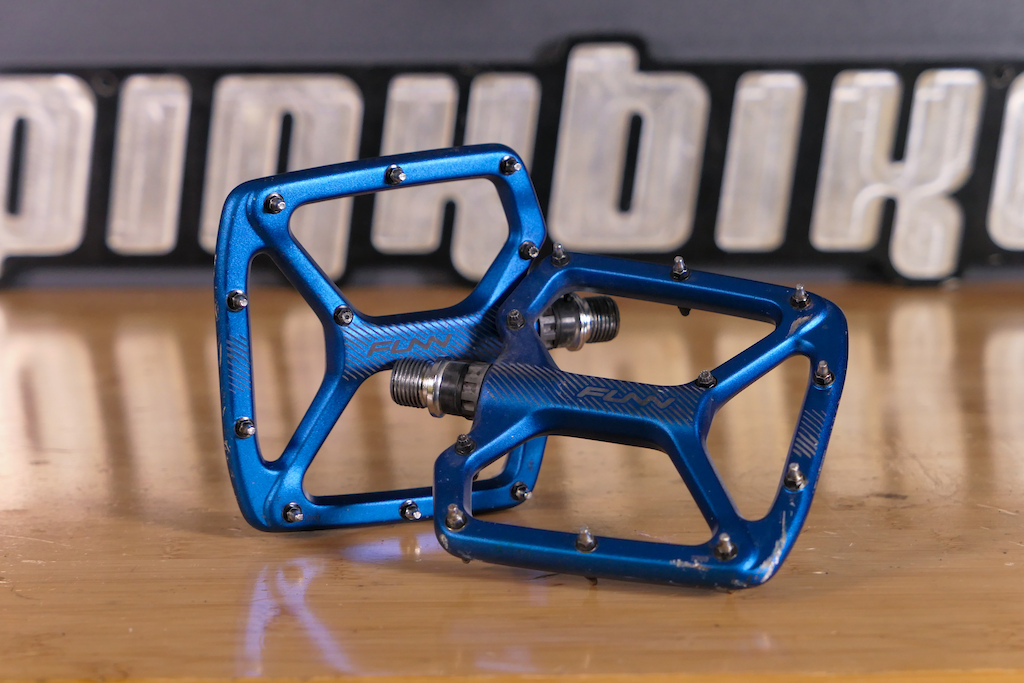
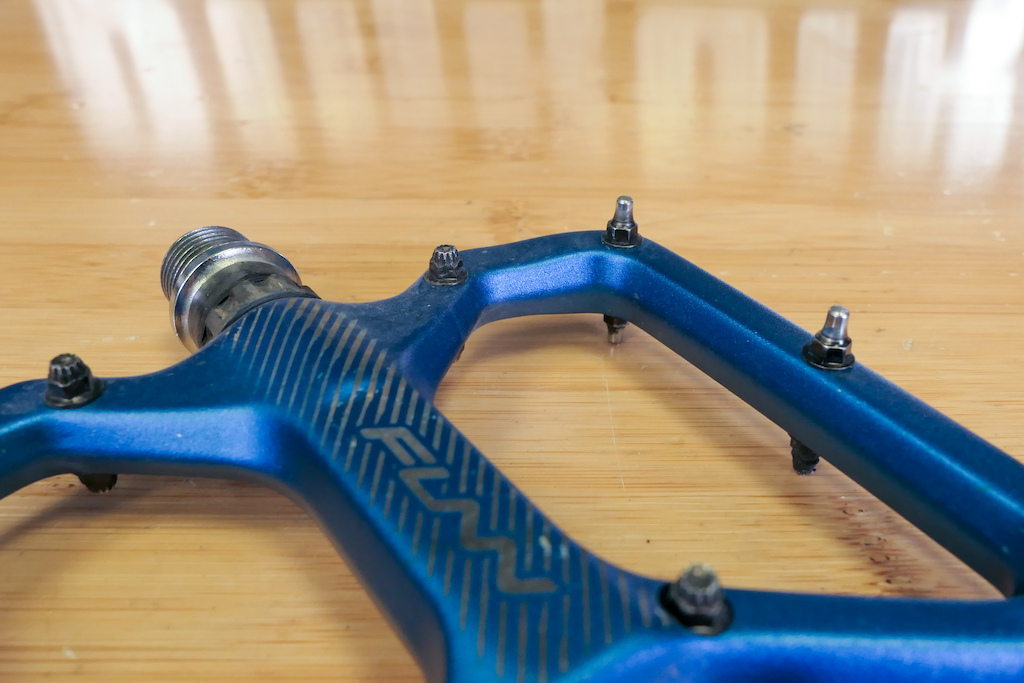
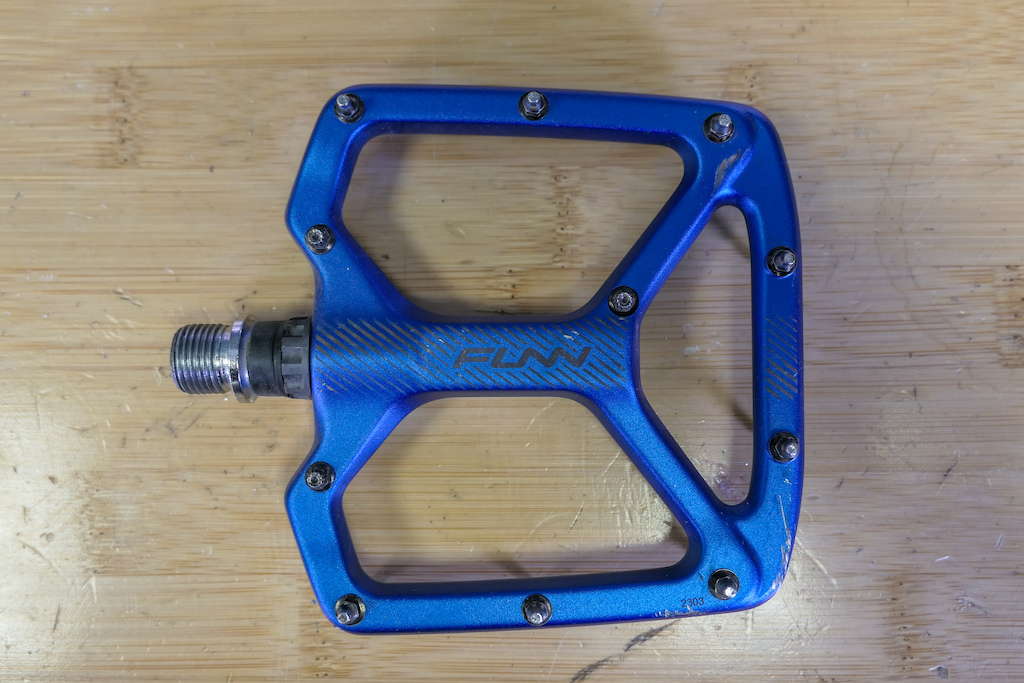
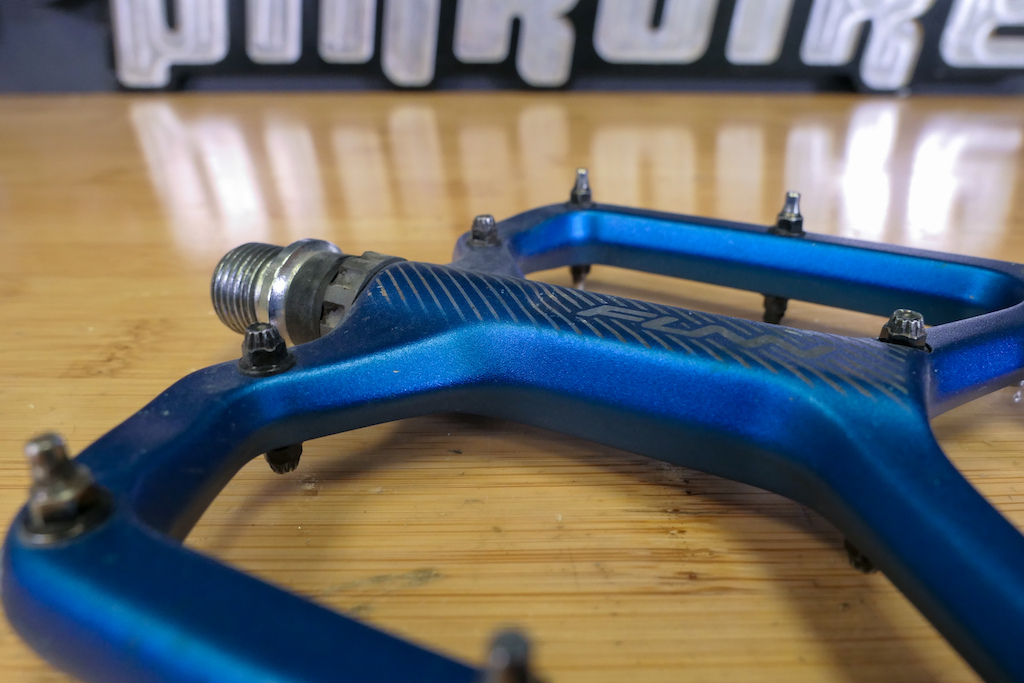

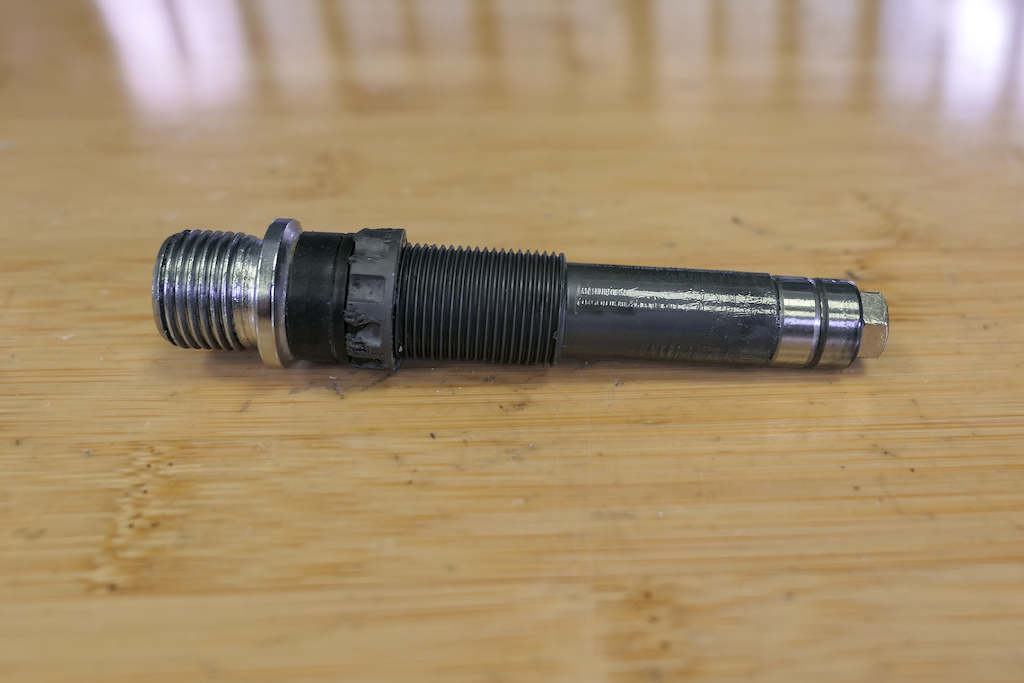
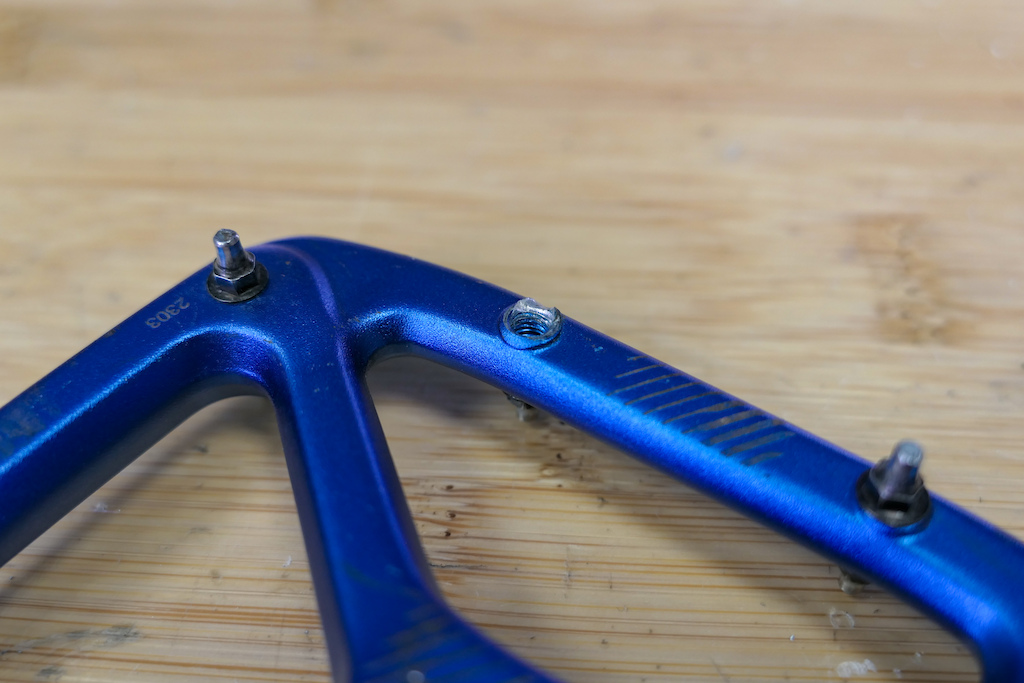

I was looking forwards to the Funn pedals as a local shop stocks the brand but the Nylon parts seem out of place on a pedal that’s not much cheaper than some top end offerings.
There’s an Xpedo pedal that looks good but I’ve not heard much about the brand before.
Aluminum flat pedals are for people who don’t ride rocky terrain and like bling.
The price/quality FUNN ratio is very good I think, but may be not for everything... it is still connoted as a "budget brand", but on a pretty high level....
Yeah I've actually always really liked Funn components - they do the job they need to and are really well priced.
It was not Funn at all.
pip install pedals
ERROR: Could not find a version that satisfies the requirement pedals (from versions: none)
ERROR: No matching distribution found for pedals
You’re not really saving much money, and they straight-up steal designs. Also, they’re clearly clueless because you can see places where they cheap out on that reduces their reliability.
I've run the gamut of flat pedals for my 25 years of riding.
I never really had much time for $200 pedals, have been using OneUp composite for several years.
Received a pair of Crank Bros Stamp pedals in large, and god damnit are they good.
I ride loads, on rough terrain, in steep jank, its where I'm happiest. The difference on fast rough sections was noticeable, shocking even. So much so that I apologized to a buddy that I had recommended the composite flats too.....
I had to buy the Stamps at a bike park after snapping a composite though.... metal is probably more durable but nylon shrugs off strikes a bit nicer.
I didnt pay for em, so I dont have that confirmation bias (maybe) that youd get from spending your own money. I still have a pair of the OneUp composites on my coaching bike, but if theres a chance to swap em, I will for sure.
As for oneup composites, I found them good but not great. This may come down to foot positioning preferences - I can see the shape working better for those who place their arches over the spindles. I tend to put my feet further back and just never gelled with them.
I think if people get a chance, it's nice to try multiple pedal shapes (i.e. convex, truly flat, and concave) at whatever price point you're comfortable with. You might find a previously untried pedal to be way better than the others.
Don't get on your high horse if you don't have a decent vocabulary.